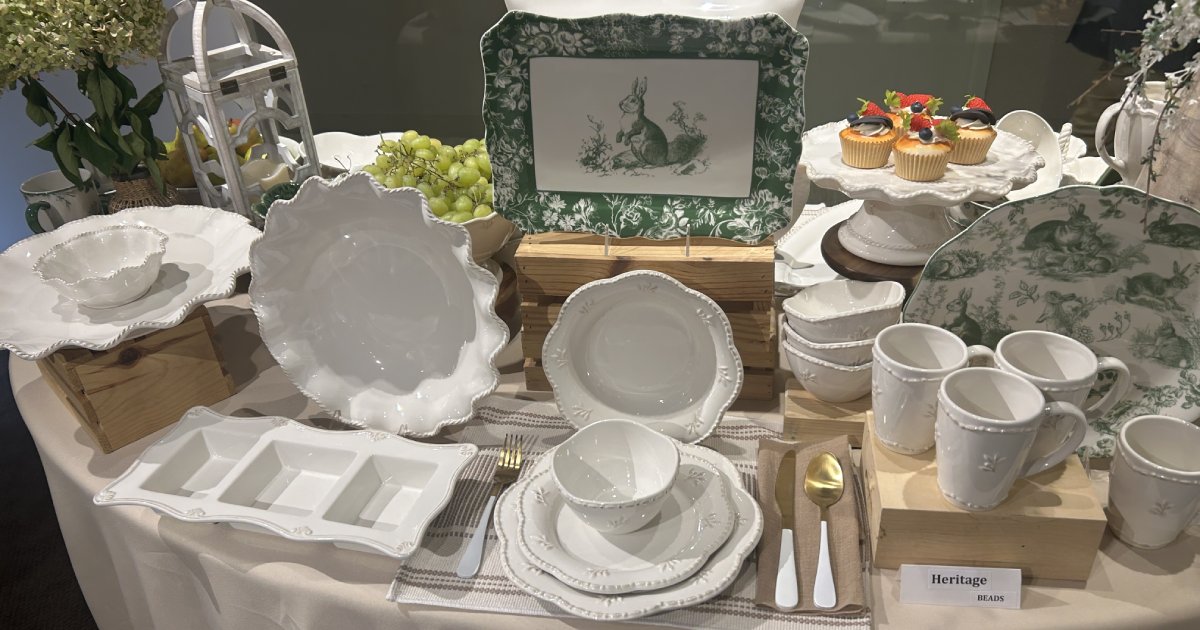Tabletop Suppliers Step Back from Celebrities

By Mark Seavy
The accent was on narrower collections and more artist-licensed products last week at the New York Tabletop Show. This marks a departure from the previous focus on celebrity-endorsed products.
In many cases, this trend was being driven by suppliers being more cautious as they plot their strategies for dealing with tariffs and production challenges. But it was also due to retailers relying less on direct importing and shifting the burden for holding inventory to the suppliers.
“If you are bringing in a celebrity, you pay them and then pay an artist to do the design,” an executive at a tabletop supplier said. “We haven’t found that a [celebrity] name drives the business. It comes down to good design, not the name that is on the package.”
In place of the usual celebrities, chefs and mixologists were popular fodder for products at this year’s Tabletop event, with the emphasis being on authenticity. Swedish tabletop supplier Orrefors, for example, paired with chef and restauranteur Bjorn Frantzen for a wine glass collection, while Pasabahce’s Nude Glass brand worked with Giorgio Bargiani, Assistant Director of Mixology at The Connaught Bar in London on a line of martini, cocktail, and mixing glasses.
There was also a focus on streamlining product lines. Lenox, for example, focused on presenting its own brands (including Oneida, Hampton Forge, Cambridge Silversmiths, and Reed & Barton) as a single package against standalone labels it had acquired during the past several years, said Raul Ruiz, Chief Marketing Officer at Lenox. In doing so, Lenox also aired plans to open a new distribution center on the West Coast in a bid to cut transportation costs and complement its 500,000-square-foot facility in Hagerstown, MD.
At the same time, Lenox also embarked on its own outbound licensing program for its Spice Village cannister and spice container line, having signed an agreement with Printfresh to introduce pajamas, robes, and tote bags. The brand itself relaunched last fall as a 24-piece Spice Village container collection, which had previously ended a 20-year run in 2009. Interest in the line was rekindled via eBay and social media posts from influencers like Ashley Wilson (At Home with Ashley), who decorated her home based on the collection’s designs.
The growing focus on tighter collections was underscored by Certified International, which introduced a new Heritage dinnerware collection featuring licensed designs by Kari Emmons Michaud, who also was behind Lenox’s Butler’s Pantry line that enjoyed a 15-year run from 2000 to 2015. Villeroy & Boch, meanwhile, which used licensed designs based on the fashion brand Supreme, shifted to its own Fleur dinnerware featuring old-school floral prints. And Vista Alegre featured an internally-designed dinnerware collection with pink accents that builds on the green that has been a top-seller.
Additionally, several companies chose contract designers over licensing deals in the belief it fostered a more direct relationship, said Emma Ros, Marketing Manager at Orrefors.
“We work with a lot of designers on a contract basis, and they get a fair amount of freedom and we feel that gives us more of a variety, including more colors,” Ros said.
When it comes to adjusting strategies in the face of tariffs, many suppliers we polled said that while the market appears to be stabilizing somewhat, they are holding on wholesale price increases for now. And some suppliers, including Certified International, met with retailers regarding the closeout of pre-tariff inventory.
“We have had some closeout meetings and if the inventory came in before the tariffs, it is very attractive for retailers,” a tabletop supplier executive said.




